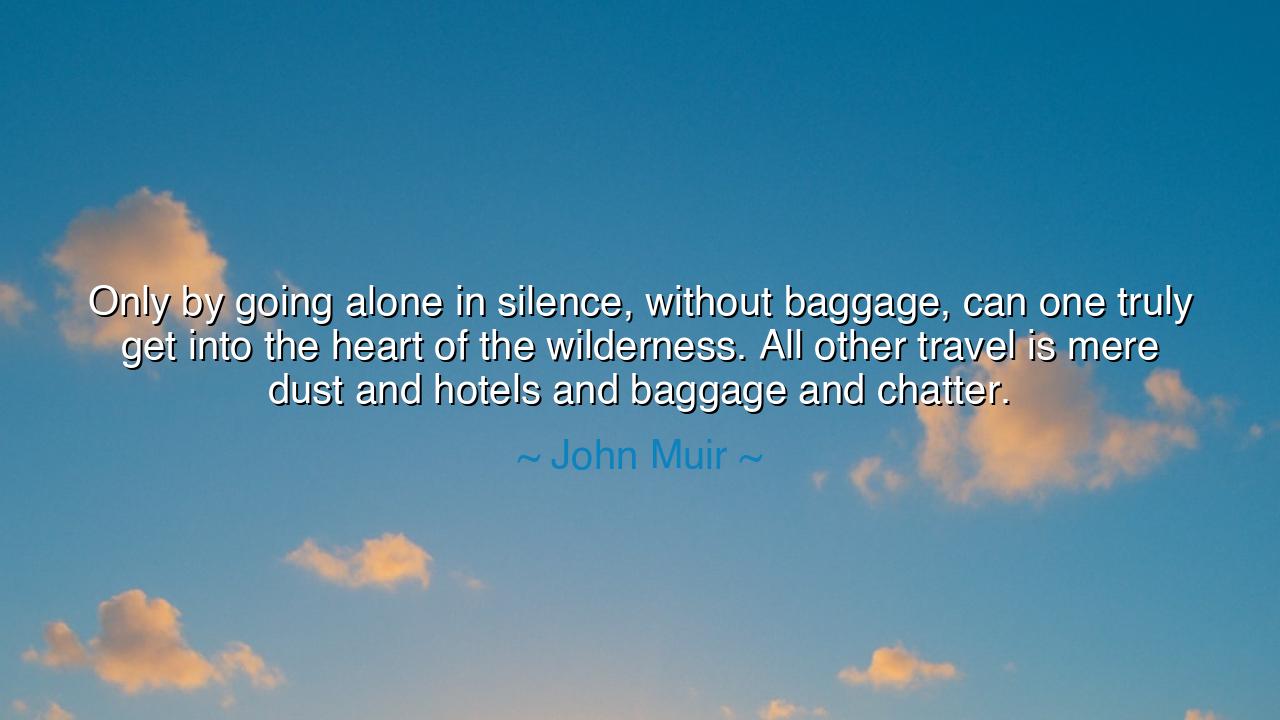
Only by going alone in silence, without baggage, can one truly
Only by going alone in silence, without baggage, can one truly get into the heart of the wilderness. All other travel is mere dust and hotels and baggage and chatter.






"Only by going alone in silence, without baggage, can one truly get into the heart of the wilderness. All other travel is mere dust and hotels and baggage and chatter." These powerful words by John Muir carry with them a deep understanding of both the human soul and the natural world. In his lifetime, Muir was not merely an explorer of landscapes, but a man who sought to understand the very essence of life through his encounters with nature. His quote speaks to the necessity of stripping away the superficial layers of modern existence—those things that distract and weigh us down—in order to truly experience the rawness and purity of the wilderness. It is only when we are free from our material attachments, our expectations, and our noise, that we can connect with the heart of the earth, and through it, connect with the deepest parts of ourselves.
In the ancient world, the idea of solitude and silence as pathways to enlightenment was central to many spiritual and philosophical teachings. The Greek philosophers, especially Socrates and Plato, often emphasized the importance of inner reflection and the need to withdraw from the distractions of society in order to find truth. Socrates famously said, “An unexamined life is not worth living.” This is the call to leave behind the superficial concerns of daily life—chatter, baggage, and distractions—and dive into the deeper questions of existence and purpose. For Plato, the ideal philosopher was one who sought to live with simplicity, free from the trappings of wealth, status, and even excessive socialization. His allegory of the cave vividly describes how, in order to see the truth, one must leave the shadows and venture into the light, away from the distractions of falsehood.
Muir’s vision of the wilderness also mirrors the teachings of the Buddha, who spoke of the importance of detachment from worldly desires in order to achieve inner peace. The Buddha encouraged his followers to seek a life free from the constant yearning for possessions and status. By removing the “baggage” of the material world, one could find clarity, tranquility, and a deeper connection to the universe. Muir, in his love for the untamed lands of America, echoed this message when he ventured into the forests and mountains not as a tourist or adventurer seeking comfort, but as a seeker of truth, longing to be unburdened by the things that would cloud his perception.
Consider the story of Henry David Thoreau, the great American philosopher and naturalist, who, like Muir, understood the transformative power of solitude and nature. In his retreat to Walden Pond, Thoreau set out to live deliberately, free from the distractions of society, in order to reconnect with the fundamental truths of existence. He wrote, “I went to the woods because I wished to live deliberately, to front only the essential facts of life, and see if I could not learn what it had to teach, and not, when I came to die, discover that I had not lived.” For Thoreau, as for Muir, the wilderness was not just a place of beauty, but a place of profound self-discovery. It was in the silence of the woods that he could truly hear the call of his own soul, away from the distractions of the world.
Muir’s statement, in a sense, teaches us that modern life—with its hustle, bustle, and endless distractions—is far removed from the essence of life itself. Our busy schedules, our material possessions, and our societal expectations all act as barriers, preventing us from experiencing the world in its most raw and authentic form. The true wilderness—whether it be a forest, a mountain, or even the depths of our own hearts—cannot be experienced fully if we are encumbered by external noise and distractions. Just as a great warrior must train in solitude to sharpen their skills, so too must we retreat from the chaos to renew our spirits and reconnect with the most essential parts of ourselves.
The lesson here is clear: in order to experience life in its fullest, we must sometimes disconnect from the external world and embark on journeys of solitude and silence. Whether this takes the form of a solitary walk in nature, a period of meditation, or a retreat from the constant demands of daily life, we must give ourselves the gift of being alone with our thoughts and the world around us. It is in solitude that we find clarity, that we are able to listen to the still voice within us, and reconnect with our purpose.
Muir’s words offer a practical call to action: to find our true selves, to experience the heart of the wilderness, we must shed the excess of our modern existence—our expectations, distractions, and material concerns. We must walk alone in silence, leaving behind the clutter of the world so that we may hear the whispers of nature and the truths of our souls. It is through this process of simplification and self-reflection that we can find a deeper connection to the world and ourselves. Thus, in every step we take, whether on a journey into the wild or in our daily lives, let us remember Muir’s wisdom: true discovery comes from within, and only by letting go of what burdens us can we truly experience the world in all its beauty and mystery.






AAdministratorAdministrator
Welcome, honored guests. Please leave a comment, we will respond soon